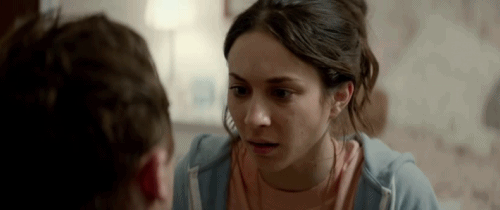The first thing that strikes you as off about Feed is Troian Bellisario’s (Pretty Little Liars) blue contact lenses. Early on in the film, they are so pale and flat as to be distracting, but as the film goes on, I wouldn’t be surprised if they were meant to be intentionally creepy. After all, Tom Felton (Harry Potter), who plays Bellisario’s twin brother, has naturally blue eyes. And with his mop of Draco Malfoy-blond hair dyed brown to match Bellisario’s, they certainly make a creepy pair of twins.
Feed’s IMDB summary reads: “Olivia and Matthew Grey are 18-year-old twins born into a world of privilege and high expectations. There are almost no boundaries between them; even their dreams are connected.” That description definitely buries the lede, so make no mistake: Feed is a horror movie (of the psychological sort rather than the stabby-bloody kind), written with consideration and acuity by Bellisario and directed by Tommy Bertelsen. Bellisario and Felton play Olivia and Matt, twins born into a wealthy but chilly family, meaning they’ve basically had to rely solely on one another for the support and love they needed growing up. Olivia is a classic type-A personality who immediately begins stressing out about her GPA at the beginning of senior year after she’s told she’s top of her class; Matt is much more relaxed and charismatic, unburdened with expectations of perfection. During a fight on the way home from a house party, where Matt hints at a disturbing level of possessiveness over his sister, their car gets into an accident. Matt dies, leaving Olivia behind, adrift and distraught, yet unable to let him go as she spirals rapidly into a breakdown.
While it hasn’t gotten as much press as To the Bone, which heavily advertised its eating disorder-related plot, Feed does address eating disorders as part of a larger mental anguish, refusing to indulge in any behavior that might trigger similar practices in the viewers. There’s no mention of calories, for one thing — nothing specific that could be imitated or adopted as a meal plan. The script smartly focuses on the damage that begins to wear Olivia down as her body’s shape and size begin to match her mental state. We see her exercising in the middle of the night; we see her shrinking in her clothes and wasting away, her skin turning grayish yellow and eyes dull and unseeing; we see her lashing out as her teachers begin to express worry over her, even as her parents completely miss her suffering. Most importantly, we are never allowed to forget that Olivia’s refusal to eat is intrinsically linked to her visions of Matt — seemingly returned as a kind of ghost — who soon turns out to be a manifestation of her eating disorder itself. Olivia’s inability to accept Matt’s death leads her to “save” her food as if saving it for him, bringing napkin-wrapped bundles of her dinner to the tree in their yard where they used to play. And while Matt’s “return” might seem like Olivia is getting some unearthly second chance to make things right with her brother, the Matt in Olivia’s head begins to torment her, eventually goading her to attempt suicide to join him, and — most significantly — threatening to abandon her when she seeks recovery.

Bellisario is haunting in the title role, but Felton steals the show as the increasingly vengeful hallucination of Matt, practically chewing the scenery in some of the later scenes as Olivia’s mourning turns uglier and uglier; their bond is perfectly believable, which makes Feed all the more devastating, and for all its potentially cliché plot points — the house party where things go wrong, the car crash, the hallucinations, the suicide attempt — it never loses its edge. Even the most cringe-inducing moment of all, when Olivia has flashbacks and dissociates so fully during sex with her love interest (Ben Winchell, Max Steel) that she cries out her brother’s name, doesn’t feel like Bellisario is exploiting the bordering-on-inappropriate relationship that always existed between the siblings, but uses it to represent a new nadir in Olivia’s condition. Olivia’s mental illness isn’t treated as some whammy plot twist — Matt’s ghost was Olivia’s brain the whole time! — due to how clearly it’s developed and advanced in concert with her eating disorder. Most importantly, it’s clear at the end of Feed that despite looking healthier and putting on weight, Olivia isn’t all better, and that getting better will take more than a meal with the boy who loves her and a pep talk with her therapist.
Apart from Bellisario and Fenton, sadly, the performances in Feed are nothing to write home about; it seems like Paula Malcomson is destined to keep playing sad, underwritten mother characters since her turn as Katniss’ mother in The Hunger Games, while James Remar (Dexter) fails to elevate the role of Olivia and Matt’s father beyond tired paternalistic bluster about making sure his daughter is home on time.
Bellisario has been quite open about her struggles with disordered eating during the press for Feed, even writing a devastating Lenny Letter in July about her experiences dealing with her illness while filming Pretty Little Liars; taken in concert with the larger feminist concerns she’s expressed in the past, it’s clear that Feed is a project that means quite a lot to her (she worked on it for nearly a decade). Beyond the brutal depiction of the toll of eating disorders, though, Feed is a powerful examination of grief, and what it means to love someone and lose them without losing oneself in the process. As such, I look forward to seeing Bellisario’s continuing evolution as a writer and actor.
Feed is available on VOD.
Top image: Feed
More from BUST
What You Need To Know About Eating Disorders Before You Watch “To The Bone”
Aubrey Plaza Is A Social Media Stalker In “Ingrid Goes West”: Review

